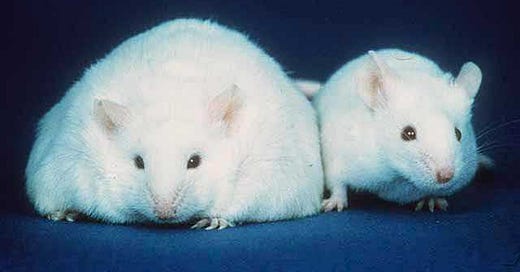How Long Could a Mouse Live?
There are a lot of restrictions on what types of experiments you can do on a human patient. I think these restrictions are, in many cases, a good thing. But that doesn't stop me from wondering, what more would we know if there were absolutely no restrictions? How much further would our medicine and technology be? Would we be 10 years more advanced? 50? 100?
One way to think about this is to home in on the average life span. What would our average lifespan be under these conditions? It's impossible to know for sure, but how could we go about making an educated guess? It's possible that humans generally don't live much beyond 100 years, and that even 500 years in the future our lifespans won't change that much. In that case, the answer's pretty clear that humans wouldn't gain much from unrestricted experiments. Maybe the best way to answer this question is to look at the lives of those where experiments are much more able to perform experiments on. Somewhere where, if you wanted to test a capability to kill cancer cells in vitro, you could simply inject the subjects with cancer. Something where any idea for genetic engineering, or caloric restriction you could think up you could perform. I'm talking about, of course, lab mice.
Lab mice have been the subjects of scientific experiments for hundreds of years. They're nearly the perfect specimen - they reproduce quickly, aren't too hard to take care of, and have a high-enough homology to humans to be useful but not so high (like chimps) to creep too many people out about using them in a lab. The use of lab mice for scientific experiments has a storied history from Joseph Priestley's studies on air and respiration (see The Invention of Air for a good read on it) to modern work with stem cells. Our freedom to experiment with mice has resulted in learning about them at a might higher rate.
So, what's the deal with mice? Given all that we've learned about mice and aging from nearly unrestricted experiments, how long could they live?
The average lifespan of a lab mouse is just over two years. (There is, of course, a ridiculous amount of study into this, but I'll spare you by just linking to one.) Yoda, the oldest lab mouse that I'm aware of, lived to be 4 years and 12 days. That's about double the average lifespan - about 136 years in human years. However, Yoda also had dwarfism, so that likely factored in as well.
But the point isn't particular to Yoda; it's particular to mice. No mouse has lived much beyond double the average lifespan, and the one that did was a special case. And there have been lots of experiments on mice in this regard. The factor that I see appearing most successful again and again is severe caloric restriction, which doesn't sound like fun. But even in those cases, none are living beyond double the lifetime.
Would this work for humans? It seems likely - caloric restriction works in a broad range of animals, including increasing lemur lifetimes by 50%. Obviously, we'd have to find out the effect the caloric restriction is doing and find another way to do that because starving for 120 years doesn't sound particularly appealing.
But overall, I find these numbers underwhelming. With people like Aubrey de Grey talking about Ending Aging, I have to say I find these numbers disappointing. While it would be great to live a healthy life to 140 years, it's not 1,000 years. It's not 10X our current lifespan. Before I start believing any of the people talking about extending human lives by 10X I'm going to need to see it in mice. Until then, I'm skeptical.



